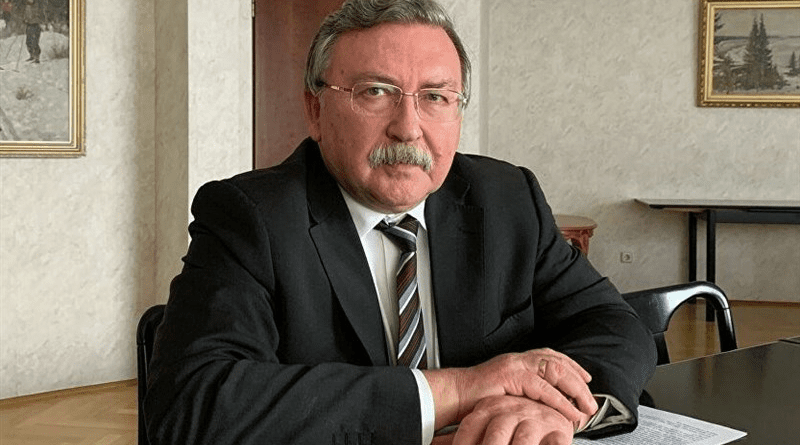Will Russia’s Invasion Of Ukraine Derail The Iran Nuclear Deal? – Analysis
By RFE RL
By Golnaz Esfandiari*
(RFE/RL) — After nearly a year of painstaking negotiations, Iran and world powers were on the brink of agreeing to restore the landmark 2015 nuclear deal.
But last-minute demands from Russia, one of the parties to the deal, have threatened to derail efforts to revive an agreement that curbed Tehran’s nuclear activities in exchange for the lifting of international sanctions.
Moscow has demanded guarantees from Washington that Western sanctions over its invasion of Ukraine will not affect its trade and military cooperation with Tehran.
The United States has described Russia’s new demands as “irrelevant.” France, another signatory of the original deal, warned they could dash hopes for a revived nuclear accord.
Moscow’ actions have been met with surprise and anger in Tehran. Iran’s foreign minister told lawmakers on March 7, without naming Russia, that Tehran would not let its interests be undermined by “foreign elements.”
Experts warn that Russia’s demands could complicate and ultimately scuttle the already fraught negotiations between Iran and world powers.
If the talks collapse, Iran could further advance its sensitive nuclear activities. It could also lead to Western countries further tightening sanctions against Tehran.
Observers say Iran and world powers could sideline Russia from the negotiations, although it is unclear whether Tehran would be willing to risk jeopardizing its relationship with Moscow, an ally.
Iran and world powers have been holding negotiations in Vienna since April 2021, with the United States taking part indirectly. In 2018, then-U.S. President Donald Trump withdrew Washington from the deal. Tehran responded by gradually exceeding the limits imposed by the pact on its nuclear activities. U.S. President Joe Biden has said he is willing to rejoin the pact if Iran return to full compliance.
‘Stabbed In The Back’
Ali Vaez, the director of the Iran Project at the International Crisis Group, says that by inserting the war in Ukraine into the complicated nuclear negotiations, Russia appears to be determined to upend the talks and take Iran down with it.
He suggested that Russia appears no longer to be interested in reviving the nuclear deal, which would allay Western concerns over Iran’s nuclear activities and allow Tehran to sell its oil. And that could bring global oil prices down.
“Neither Iran’s return to the oil market nor the peaceful resolution of a Western security concern in the Middle East benefits the Kremlin,” Vaez told RFE/RL. “The leadership in Tehran is waking up to the reality that you often get stabbed in the back by those you believed to have your back.”
‘Tank The Talks’
Analysts say the scope of Russia’s demands will determine whether they complicate or scuttle the negotiations entirely.
Russian Foreign Minister Sergei Lavrov on March 5 said that Moscow wanted written guarantees that sanctions ‘‘launched by the U.S. will not in any way harm our right to free, fully fledged trade and economic and investment cooperation and military-technical cooperation with Iran.”
Russia’s new demands coincided with mounting international pressure on Moscow over its unprovoked invasion of Ukraine on February 24, a move that has resulted in unprecedented Western sanctions.
U.S. Secretary of State Antony Blinken dismissed Russia’s demands on March 6, saying U.S. sanctions that are “being put in place and that have been put in place on Russia have nothing to do with the Iran nuclear deal.”
“If it is simply exemptions that allow Russia to help Iran meet its nuclear obligations in the deal, that is one thing,” Eric Brewer, a senior director at Nuclear Threat Initiative (NTI), a Washington-based think tank, told RFE/RL.
“But Lavrov’s comments suggest Russia is after something much bigger. I don’t see the United States giving Russia that type of sanctions relief, even if it endangers a revival of the [nuclear deal],” he added.
Brewer says the United States and Russia have been able to cooperate on shared nonproliferation interests in the past, even when tensions have been high. But he says it is possible that Russia’s recent demands “tank the talks.”
‘Critical Decision’
Vali Nasr, a professor of international affairs and Middle East studies at Johns Hopkins University, says Russia’s demands have forced Iran to make a difficult choice: to stick by Russia and incur the diplomatic and economic costs of the talks collapsing or to ditch Moscow and endanger its ties with an ally.
“Iran would have to decide how important an agreement is to its national interest, and whether it will allow talks it has invested so much in and built its economic and foreign policies around [to] be taken hostage by Russia,” Nasr, who served as a senior adviser to the Obama administration, told RFE/RL. “It will be a critical decision for Tehran.”
Nasr suggested that sidelining Russia was possible.
“The nuclear side of things is in Iran’s hand. The sanctions are in the hands of the U.S. and Europe. Russia’s only leverage is to prevent a deal,” Nasr said.
Brewer says the other parties to the deal would have to find ways to replace Russia’s technical role under the deal, including removing excess enriched uranium from Iran.
“Given enough time, you could probably come up with some workarounds for other parties to take Russia’s place on these technical areas,” he says. “But it won’t be easy, and time is in short supply.
“At a practical level, it would be incredibly challenging to reimplement the deal if Russia, the United States, and Europe are not in alignment on the [nuclear deal] and if Russia is actively trying to play the role of spoiler.”
- Golnaz Esfandiari is a senior correspondent with RFE/RL.

